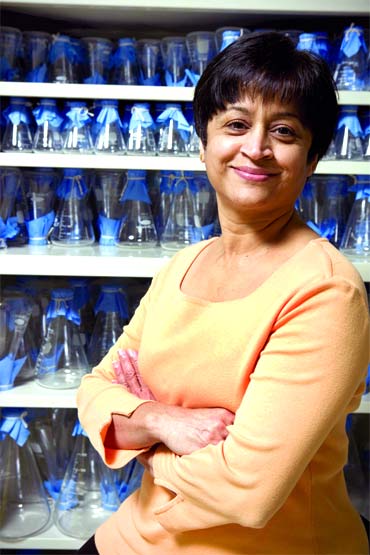
Dr Bharati Bapat is among the handful of female scientists worldwide with insight into how epigenetics influences our risk of cancer, an emerging field in cancer research.
Bapat, who did her PhD in biochemistry from Mumbai University and post-doctoral work at Dalhousie University in Nova Scotia, discusses her research and its implications for the human race with Rediff.com's Ajit Jain.
What drew you to epigenetic research on cancer?
I work with a lot of specialists, surgeons, urologists, pathologists. In the case of prostate cancer research, there was one clinical diagnostic dilemma that became apparent to me when I was talking to my colleagues. They were struggling to find some kind of additional tools to identify patients before they can actually develop an aggressive form of cancer. So, the goal is to introduce genetic markers with the existing diagnostic tests like microscopic examination of the tissues in order to improve the diagnostic test.
Why the emphasis on prostate and colon cancer?
The focus of my research programme is to discover and analyse DNA markers of cancer risk assessment. For example, say to monitor the course of how the prostate cancer progresses.
My research on colon cancer has a two-fold focus. One aspect focuses on people who have family history of colon cancer. Colon cancer is fairly common in the West. If you look at all colon cancer patients, 5 percent of those patients could be suffering due to this kind of genetic risk. My efforts have been to examine such families using DNA markers.
What happens in such families is that there are genes that are known to cause this hereditary risk; these are being passed on from one generation to the next. You can detect mutations using DNA obtained from blood samples before the disease develops.
And your research can stop that from happening?
Yes. There are two major inherited colon cancer syndromes. Familiar Adenomatous Polyposis is caused by specific mutations in the APC (adenomatous polyposis coli) gene. The second type of inherited colon cancer disease, called the Lynch Syndrome, is caused by another group of genes known as mismatch repair or MMR genes. In such families one of the two parents of the patient is affected by colon cancer. If you examine their family history, you will observe that sometimes colon cancer occurs in other family members as well, including grandparents, uncles and aunts. You could obtain blood samples from people with cancer in such families (to identify) specific genetic mutations that cause the disease. Once you find genetic abnormalities, you could offer predictive genetic or diagnostic testing to check for the presence or absence of the same genetic mutation among other family members starting at age as early as 10 or 12.
The reason we can offer predictive genetic testing when they are 10-12 is because very few younger than 10 or 12, have colon cancer. Colon cancer happens much later in life. If you do monitor them after such testing, say there are three children in the family and one of them has this particular genetic mutation, you can monitor that one person with regular colonoscopy.
 |
Many colon cancer associated symptoms can go undetected. There could be such symptoms as general lack of energy, may be constipation, may be blood in the stool, etc. Many patients ignore such symptoms or they don't make the connection. So, by the time colon cancer is diagnosed, it may be already too late. With recent progress in using molecular diagnostic tests such patients can be diagnosed before any clinical symptoms develop. It allows early intervention, including appropriate treatment and preventive surgery.
What about the remaining 95 percent who don't run the genetic risk?
Among the remaining 95 percent of patients, there's research in progress that points towards 20-30 percent of the having some kind of combination of other genetic mutations or abnormalities, combined with certain environmental risk factors. For example, if a person is eating poor diet, i.e. a diet rich in red meat or not eating a diet that's rich in fiber and vegetables and fruits. Other environmental or lifestyle risk factors include not doing sufficient exercise or smoking. Those kind of environmental influences have been found to interact with certain types of genes, increasing the risk of colon cancer.
Other products such as exposure to asbestos are known to increase lung cancer risk.
For the remaining majority there's still a combination of genes and environment, but it is probably not as strong as you see among families with hereditary colon cancer.

How does your innovative profiling of genes tie in the genetic and the environmental risk?
My research team has taken two approaches. One is genome profiling, which looks for specific changes in genes and their expression. There are also epigenetic alterations, which are discovered by epigenetic profiling.
We are doing profiling of the whole genomes. We take tissues from patients who are suffering say from prostate cancer and have already been operated on. Genome profiling helps us discover new changes, new markers, the unique combination of these genetic and epigenetic markers that will allow us to identify/establish what is known as genetic signatures for individual patients.
There's growing recognition that all cancers are not the same If you direct genetic or epigenetic signatures for the patients, you can monitor their progress much more carefully, with the monitoring specifically designed for individual patient's needs. Additionally, you can identify such patients much earlier during the course of cancer development, sometimes even before the cancer occurs in a patient.
The other strategy of analysis of molecular genetic and epigenetic material is analysing samples of the patients obtained from a large series of patients who have been operated upon for known genetic markers. By comparing such marker information with patients' clinical symptoms at a population level we can identify specific relationships between the type(s) of markers and clinical or environmental risk factors. Such studies reveal genetic markers or epigenetic markers associated with say 'good prognosis' or some kind of dietary component.
The overall goal of all these studies is to discover molecular markers associated with early diagnosis, prognosis and chemotherapeutic response.
Prostate cancer has a long gestation period, so very often patients die due to some other causes. How is that aspect figuring in your research?
It's widely stated that patients actually die with prostate cancer rather than because of it. What it means is that with widely used PSA testing, there's more and more increased diagnosis of prostate cancer cases. Lots of these patients are old. Many a times something else may be the reason of their death, not the cancer.
We are now trying to identify the group of patients who have the aggressive form of prostate cancer, so that they can be treated much more aggressively in the clinical setting -- chemotherapy or surgical procedure -- and at the same time identify prostate cancer patients who can be just treated by what's called 'active surveillance.' That's monitoring patients by bringing them into the clinic every six months or so depending on their overall condition.
Our challenge is now to identify this aggressive group of patients and separate them from the patients who are eligible for active surveillance using epigenetic markers If you separate these two group of patients and target health procedures and health benefits accordingly, you have actually alleviated both groups.
Are you confining your study to Canada?
I have established collaboration with colleagues from other countries. Through an international consortium, we have recruited patients for such studies from six centers in the United States, Australia and Canada.
Do you find any difference in the research in these countries?
 |
We recently focused on comparing samples that were recruited in Toronto and Newfoundland. And the reason for looking at the population in Newfoundland compared to Toronto is because of some inherent differences in these two populations. There are specific types of cancers that are much more prevalent among Newfoundlanders as (compared to) Ontario (which) represents a more diverse population compared to Newfoundland. Another reason is the exposure to other genetic or environmental factors like certain types of diets.
At what stage is your research?
The comparative study of colon cancer patients in Newfoundland and Ontario has been published. We have now primarily been focusing on the Ontario population for prostate cancer studies. We have discovered a set of epigenetic signatures for improved monitoring of prostate cancer patients.
Our goal for prostate cancer research is to develop a clinic-based easy to use diagnostic test to see if we can detect these epigenetic markers in urine samples of patients, instead of prostate tissue or blood samples. The goal will be to develop a diagnostic that is much easier for patients to adapt to. To provide urine samples for genetic testing will be much easier than having to go to a clinic to give a blood sample, or for prostate biopsy.